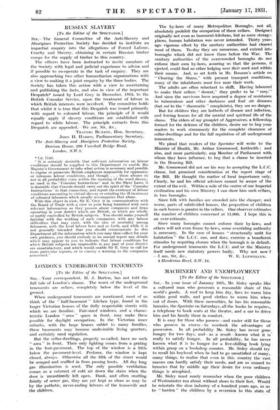LONDON'S UNDERGROUND TENEMENTS
[To the Editor of the SPECTATOR.] SIR,—Your correspondent, H. J. Barton, has not told the full tale of London's shame. The worst, of the underground tenements are cellars, completely below the level of the ground.
When underground tenements are mentioned, most of us think of the " half-basement " kitchen type, found in the larger Victorian houses of the dully respectable streets with which we are familiar. Fair-sized windows, and a charac- teristic London " area " space in front, may make these possible for daylight occupation. In the Victorian inner suburbs, with the large houses sublet to many families, these basements may become undesirable living quarters, and certainly need regulation.
But the cellar-dwellings, properly so-called, have no such " area " in front. Their only lighting comes from a grating in the foot-pavement. The top of the window is a little below the pavement-level. Perforce, the - window is kept closed, always. Otherwise all the filth of the street would be scraped and scuffled in from passing boots. All day long gas illumination is used. The only possible ventilation comes as a cataract of cold air down the stairs when the door is 'Incautiously left open. Dank, and often smelling faintly of sewer gas, they arc yet kept as clean as may be by the pathetic, never-ending labours of the housewife and the children. The by-laws of many Metropolitan Boroughs, not all, absolutely prohibit the occupation of these cellars. Designed originally not even as basement-kitchens, but as mere storage: places, human habitation was never intended. Thirty years ago vigorous effort by the sanitary authorities had cleared most of them. To-day they are numerous, and extend into boroughs which did not know them before the War. The sanitary authorities of the overcrowded boroughs do not enforce their own by-laws, assuring us that the persons, if ejected, could find no other lodging near their work and within their means. And, as set forth in Mr. Bossom's article on
Clearing the Slums," with present transport conditions, many of the inhabitants must live near their work.
The adults are often reluctant to shift. Having laboured to make their cellars decent," they prefer to be "rosy." And since the survivors have acquired a degree of resistance to tuberculosis and other darkness and foul air diseases (but not to the " rheumatic " complaints), they see no danger.
But for children they are hotbeds of disease and infection, and forcing houses for all the mental and spiritual ills of the slums. The elders of my grouplet of Aggressives; a fellowship formed for the defence of the children,- desire me to beg your readers to work strenuously for the complete clearance of cellar-dwellings and for the full regulation of all underground tenements.
We plead that readers of the Spectator will write to the Minister of Health, Mr. Arthur Greenwood, forthwith ; and also, and more particularly, any Member of Parliament with whom they have influence, to beg that a clause be inserted in the Housing Bill.
Mr. Greenwood did not see his way to accepting the L.C.C. clause, but promised consideration at the report stage of the Bill. He thought the matter of local importance only. Clearly, he and his official advisers cannot be aware of the extent of the evil. Within a mile of the centre of our Imperial civilization and his own Ministry I can show him such cellars, in two boroughs.
Since folk with families are crowded into the cheaper, and worse, parts of subdivided houses, the proportion of children in such houses is greater in the cellars. One observer estimates the number of children concerned at 11,000. 1 hope this is an over-estimate.
Since many boroughs cannot enforce their by-laws, and others will not even frame by-laws, some overriding authority is necessary. In the case of houses "structurally unfit for habitation" the L.C.C. can, and does, exercise a beneficent stimulus by requiring closure when the borough is in default. For underground tenements the L.C.C. and for the Ministry itself needs new statutory powers badly. Why not now ?
—I am, Sir, &c., W. E. LLEWELLYN. 4 Henderson Road, S. W. 18.




































 Previous page
Previous page